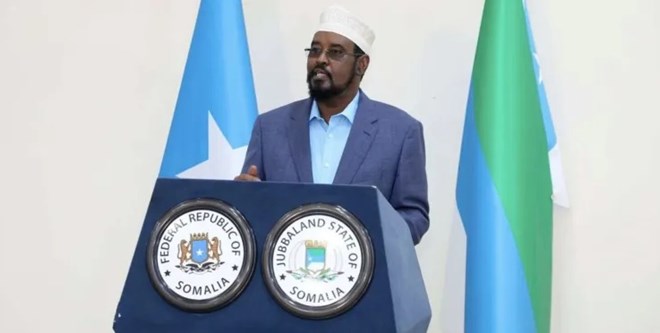
Sunday December 1, 2024
Somalia’s federal government has formally requested an Interpol Red Notice to arrest Jubbaland President Ahmed Mohamed Islam, also known as “Madobe.”
The Banadir Regional Court in Mogadishu authorized the request, accusing Madobe of treason, collusion with foreign powers, and actions undermining Somalia’s national unity.
This move is the latest chapter in a bitter feud between the Somali federal government and Jubbaland’s semi-autonomous administration. The rift intensified after Madobe withdrew from crucial government consultations last month, throwing Somalia’s already fragile state-building process into further uncertainty. The charges against him signal a deepening divide that threatens to destabilize the country.
Somali authorities claim that Madobe collaborated with foreign governments to destabilize the nation, sharing sensitive national security information. Federal officials argue that his actions obstruct Somalia’s efforts to implement much-needed electoral reforms, including the much-debated “one person, one vote” system.
However, Jubaland officials have denounced the charges as politically motivated, accusing Mogadishu of using legal avenues to weaken regional autonomy and power.
The legal clash has triggered a tit-for-tat response, with Jubaland’s First Instance Court issuing an arrest warrant for Somali President Hassan Sheikh Mohamud, accusing him of treason and inciting rebellion. These parallel legal actions underscore the growing tension between Somalia’s central government and the Jubbaland administration.
This as an unprecedented legal conflict in Somalia.
The conflict between Jubaland and Somalia is rooted in a combination of political, historical, ethnic, and strategic factors:
1. Federalism vs. Centralism
- Somalia’s federal system is relatively new and poorly defined, leading to disputes over the division of powers between the federal government in Mogadishu and federal member states like Jubbaland.
- Jubaland, with its own leadership, often seeks greater autonomy, while the Somali federal government aims to assert more control over the region.
2. Clan Dynamics
- Clan affiliations play a central role in Somali politics. Jubaland is dominated by the Ogaden clan, whose interests often clash with those of other clans supported by the central government.
- The federal government has been accused of favoring certain clans over others, exacerbating existing tensions.
- Geographical Spread: The Ogaden clan predominantly resides in Jubaland (southern Somalia), parts of Ethiopia’s Somali Region (Ogaden region), and northeastern Kenya. This wide distribution has led to disputes over land, grazing rights, and water resources, especially with neighboring Somali clans.
- Economic Resources: In regions like Jubaland, the Ogaden’s dominance in Kismayo and other resource-rich areas creates competition with other clans over control of trade routes, ports, and agricultural lands.
2. Clannism and Political Rivalries
- Dominance in Jubaland: The Ogaden clan’s significant influence in Jubaland, particularly under leaders like Ahmed Madobe, often leads to rivalry with other clans, such as the Marehan and Hawiye, who also seek political representation and control.
- Federal Government Alliances: The Somali federal government has historically supported rival clans to counterbalance the Ogaden’s dominance, intensifying local tensions.
3. Cross-Border Ethnic Identity
- The Ethiopian Ogaden Region: The Ogaden clan has a history of rebellion in Ethiopia, where they fought for self-determination through the Ogaden National Liberation Front (ONLF). This struggle has shaped their identity as a politically active and historically marginalized group, influencing their interactions in Somalia.
- Kenya-Somalia Border Issues: The Ogaden’s presence in northeastern Kenya adds another layer of complexity, as cross-border clan dynamics often involve resource disputes and migration pressures.
4. Historical Grievances
- Marginalization in the Somali Republic: After Somalia gained independence in 1960, the Ogaden clan often felt politically marginalized compared to other major Somali clans, such as the Hawiye and Darod sub-clans.
- Post-1991 Collapse: Following the fall of Siad Barre’s regime, Somalia’s collapse into clan-based fiefdoms exacerbated tensions, with the Ogaden asserting dominance in areas like Jubbaland, creating rivalries with other clans.
5. Tensions with the Marehan Clan
- The Ogaden and Marehan clans, both part of the larger Darod clan family, have longstanding territorial and political disputes, particularly in Jubaland.
- Conflicts often arise over control of administrative positions and resources, as both clans vie for dominance in the region.
6. Role of External Actors
- Kenya’s Influence: Kenya supports the Ogaden-led administration in Jubbaland as a buffer against Al-Shabaab. This external support fuels resentment from other Somali clans and the federal government, who view it as favoritism.
- Ethiopia’s Policies: Ethiopia’s historical suppression of Ogaden activism (the ONLF rebellion) has shaped the clan’s sense of solidarity and resistance, which spills over into Somali clan politics.
7. Al-Shabaab and Security Issues
- The Ogaden clan’s territories, particularly in Jubaland, are frontline regions in the fight against Al-Shabaab. Disputes over who controls security forces and access to international military aid exacerbate clan rivalries.
- Al-Shabaab exploits these divisions by recruiting from marginalized segments of clans, including the Ogaden, to destabilize the region further.